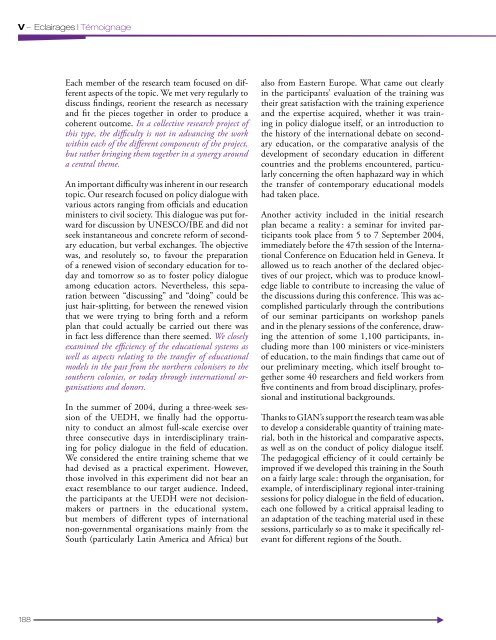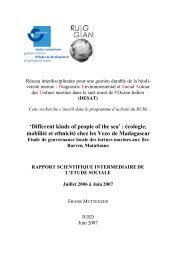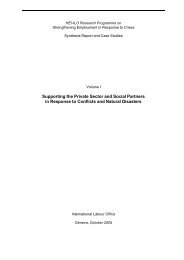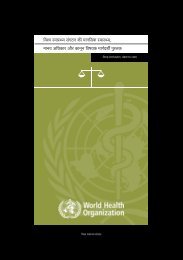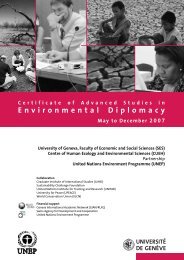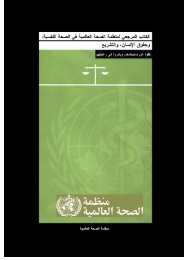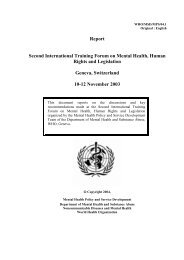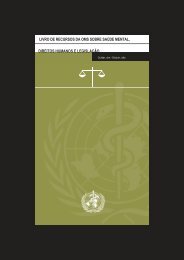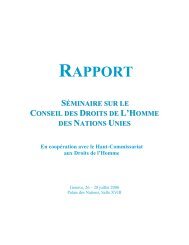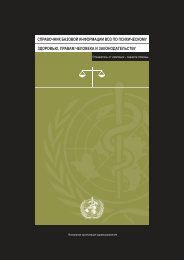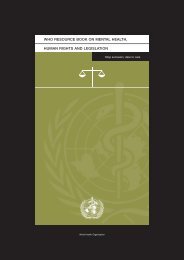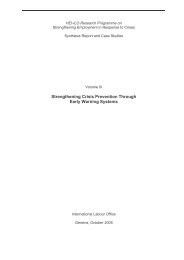Les liaisons fructueuses - RUIG-GIAN
Les liaisons fructueuses - RUIG-GIAN
Les liaisons fructueuses - RUIG-GIAN
Create successful ePaper yourself
Turn your PDF publications into a flip-book with our unique Google optimized e-Paper software.
V – Eclairages | Témoignage<br />
Each member of the research team focused on different<br />
aspects of the topic. We met very regularly to<br />
discuss findings, reorient the research as necessary<br />
and fit the pieces together in order to produce a<br />
coherent outcome. In a collective research project of<br />
this type, the difficulty is not in advancing the work<br />
within each of the different components of the project,<br />
but rather bringing them together in a synergy around<br />
a central theme.<br />
An important difficulty was inherent in our research<br />
topic. Our research focused on policy dialogue with<br />
various actors ranging from officials and education<br />
ministers to civil society. This dialogue was put forward<br />
for discussion by UNESCO/IBE and did not<br />
seek instantaneous and concrete reform of secondary<br />
education, but verbal exchanges. The objective<br />
was, and resolutely so, to favour the preparation<br />
of a renewed vision of secondary education for today<br />
and tomorrow so as to foster policy dialogue<br />
among education actors. Nevertheless, this separation<br />
between “discussing” and “doing” could be<br />
just hair-splitting, for between the renewed vision<br />
that we were trying to bring forth and a reform<br />
plan that could actually be carried out there was<br />
in fact less difference than there seemed. We closely<br />
examined the efficiency of the educational systems as<br />
well as aspects relating to the transfer of educational<br />
models in the past from the northern colonisers to the<br />
southern colonies, or today through international organisations<br />
and donors.<br />
In the summer of 2004, during a three-week session<br />
of the UEDH, we finally had the opportunity<br />
to conduct an almost full-scale exercise over<br />
three consecutive days in interdisciplinary training<br />
for policy dialogue in the field of education.<br />
We considered the entire training scheme that we<br />
had devised as a practical experiment. However,<br />
those involved in this experiment did not bear an<br />
exact resemblance to our target audience. Indeed,<br />
the participants at the UEDH were not decisionmakers<br />
or partners in the educational system,<br />
but members of different types of international<br />
non-governmental organisations mainly from the<br />
South (particularly Latin America and Africa) but<br />
also from Eastern Europe. What came out clearly<br />
in the participants’ evaluation of the training was<br />
their great satisfaction with the training experience<br />
and the expertise acquired, whether it was training<br />
in policy dialogue itself, or an introduction to<br />
the history of the international debate on secondary<br />
education, or the comparative analysis of the<br />
development of secondary education in different<br />
countries and the problems encountered, particularly<br />
concerning the often haphazard way in which<br />
the transfer of contemporary educational models<br />
had taken place.<br />
Another activity included in the initial research<br />
plan became a reality : a seminar for invited participants<br />
took place from 5 to 7 September 2004,<br />
immediately before the 47th session of the International<br />
Conference on Education held in Geneva. It<br />
allowed us to reach another of the declared objectives<br />
of our project, which was to produce knowledge<br />
liable to contribute to increasing the value of<br />
the discussions during this conference. This was accomplished<br />
particularly through the contributions<br />
of our seminar participants on workshop panels<br />
and in the plenary sessions of the conference, drawing<br />
the attention of some 1,100 participants, including<br />
more than 100 ministers or vice-ministers<br />
of education, to the main findings that came out of<br />
our preliminary meeting, which itself brought together<br />
some 40 researchers and field workers from<br />
five continents and from broad disciplinary, professional<br />
and institutional backgrounds.<br />
Thanks to <strong>GIAN</strong>’s support the research team was able<br />
to develop a considerable quantity of training material,<br />
both in the historical and comparative aspects,<br />
as well as on the conduct of policy dialogue itself.<br />
The pedagogical efficiency of it could certainly be<br />
improved if we developed this training in the South<br />
on a fairly large scale : through the organisation, for<br />
example, of interdisciplinary regional inter-training<br />
sessions for policy dialogue in the field of education,<br />
each one followed by a critical appraisal leading to<br />
an adaptation of the teaching material used in these<br />
sessions, particularly so as to make it specifically relevant<br />
for different regions of the South.<br />
188


